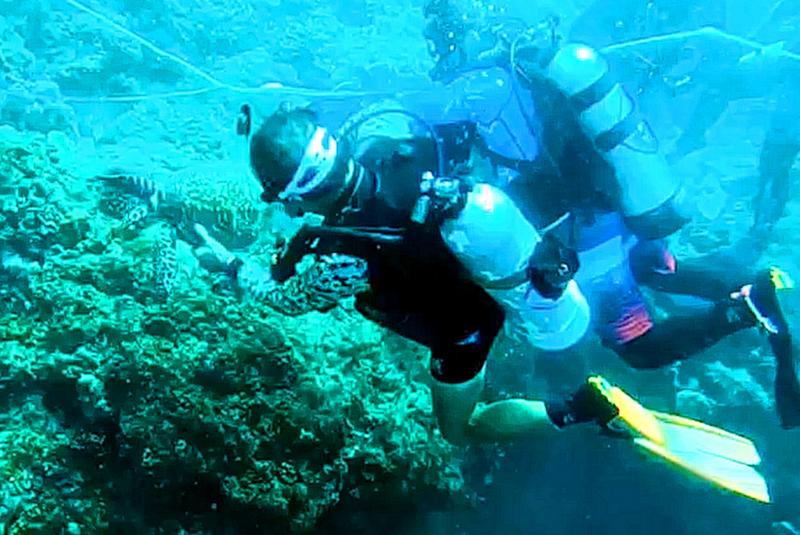A diver on Saturday tried in vain to save a critically endangered sea turtle that became entangled in a fishing net off the southern coast — the 49th such case this year.
“I am really heartbroken,” the diving instructor, surnamed Tseng (曾), said yesterday of losing the hawksbill sea turtle, despite administering cardiopulmonary resuscitation (CPR).
Tseng was with a trainee at a diving spot off Shanhai Fishing Harbor (山海漁港) in Pingtung County’s Hengchun Township (恆春) when they discovered a discarded 2m-by-40m gillnet.

Photo courtesy of a diving coach surnamed Tseng
Caught in the net was a hawksbill sea turtle on the verge of death, he said.
Tseng said that he cut the turtle out of the net and brought it to the surface to perform CPR, but he could not save it.
Lee Tsung-hsien (李宗賢), a sea turtle expert at the National Museum of Marine Biology, said that he could understand the diver’s intentions when he administered CPR, but would advise against it.
Aside from the risk of infection, if the turtle’s esophagus had been blocked, the breath might not have even reached its lungs, Lee said.
In most cases, Lee suggested bringing the turtle to shore and calling for help.
The Coast Patrol Corps 6 said that apart from the hawksbill, it also retrieved a dead green sea turtle from Checheng Township (車城) on Saturday.
Both turtles have been sent to the museum to determine the cause of death, it said.
Kenting National Park Administration Deputy Director Hsu Shu-kuo (許書國) said that people caught placing gillnets on park grounds could be fined NT$3,000 (US$105.49) under the National Park Act (國家公園法).
If it results in the injury or death of a wild animal, the incident would become a contravention of the Wildlife Conservation Act (野生動物保育法), which stipulates a jail sentence of six months to five years, in addition or commutable to a NT$600,000 to NT$1 million fine, Hsu said.
The museum this year has received reports of 49 injured or deceased sea turtles, a jump from the 38 it received last year, Lee said.
Sea turtles can easily become entangled in fishing nets, leading to injury or death, he said.
Plastics from bags and other products accumulate in seaweed, posing a danger as they could be mistakenly ingested, Lee added.
The Ocean Conservation Administration called on anyone who discovers an imperiled sea turtle to call the coast guard emergency hotline at 118 or the local marine conservation authority.
Additional reporting by Hung Chen-hung

The Ministry of the Interior (MOI) is to tighten rules for candidates running for public office, requiring them to declare that they do not hold a Chinese household registration or passport, and that they possess no other foreign citizenship. The requirement was set out in a draft amendment to the Enforcement Rules of the Public Officials Election and Recall Act (公職人員選舉罷免法 ) released by the ministry on Thursday. Under the proposal, candidates would need to make the declaration when submitting their registration forms, which would be published in the official election bulletin. The move follows the removal of several elected officials who were

The Republic of China (ROC) is celebrating its 114th Double Ten National Day today, featuring military parades and a variety of performances and speeches in front of the Presidential Office in Taipei. The Taiwan Taiko Association opened the celebrations with a 100-drummer performance, including young percussionists. As per tradition, an air force Mirage 2000 fighter jet flew over the Presidential Office as a part of the performance. The Honor Guards of the ROC and its marching band also heralded in a military parade. Students from Taichung's Shin Min High School then followed with a colorful performance using floral imagery to represent Taiwan's alternate name

FOUR DESIGNATED AREAS: Notices were issued for live-fire exercises in waters south and northwest of Penghu, northeast of Keelung and west of Kaohsiung, they said The military is planning three major annual exercises across the army, navy and air force this month, with the navy’s “Hai Chiang” (海強, “Sea Strong”) drills running from today through Thursday, the Ministry of National Defense said yesterday. The Hai Chiang exercise, which is to take place in waters surrounding Taiwan, would feature P-3C Orion maritime patrol aircraft and S-70C anti-submarine helicopters, the ministry said, adding that the drills aim to bolster the nation’s offshore defensive capabilities. China has intensified military and psychological pressure against Taiwan, repeatedly sending warplanes and vessels into areas near the nation’s air defense identification zone and across

A Chinese takeover of Taiwan would severely threaten the national security of the US, Japan, the Philippines and other nations, while global economic losses could reach US$10 trillion, National Security Council Deputy Secretary-General Lin Fei-fan (林飛帆) wrote in an article published yesterday in Foreign Affairs. “The future of Taiwan is not merely a regional concern; it is a test of whether the international order can withstand the pressure of authoritarian expansionism,” Lin wrote in the article titled “Taiwan’s Plan for Peace Through Strength — How Investments in Resilience Can Deter Beijing.” Chinese President Xi Jinping’s (習近平) intent to take Taiwan by force